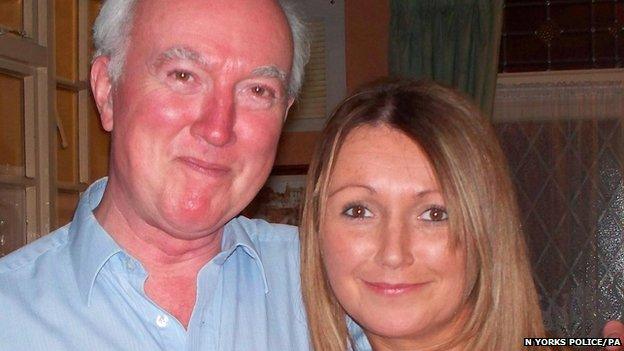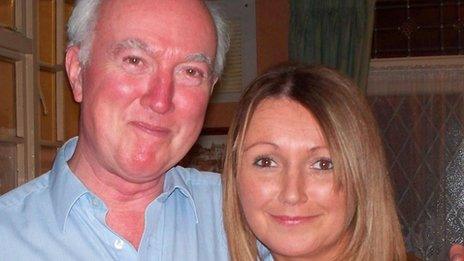Missing people's families get new help
- Published

Peter Lawrence and his daughter Claudia, who disappeared in 2009. He has campaigned for a change in the law
A law that makes it easier for families to deal with the affairs of people who are missing and presumed dead comes into force in England and Wales on Wednesday.
It follows a lengthy campaign by a charity and by relatives of some of those who've disappeared.
The new law will allow the families to apply for a Certificate of Presumed Death.
Scotland and Northern Ireland already have similar legislation in force.
About 250,000 people are reported missing every year in the UK.
While most quickly reappear, the families of those who don't can face years of legal and financial difficulties, on top of emotional trauma.
Death certificate
Even when it seems clear that a missing person is most likely to be dead, it can be difficult to register that person's death without proof.
With no death certificate, families often struggle to administer the missing person's estate, claim pensions or benefits, or deal with their mortgage or life insurance.
Families will now be able to apply for a Certificate of Presumed Death for a loved one who has gone missing and is presumed dead.
It will mean that any marriage or civil partnership will come to an end in the same way as if the missing person had died, and that property can be inherited under the missing person's will.
It will also mean that grieving families will also be able to close bank accounts, stop direct debits, cancel passports, and apply for probate.

Case Study: Kevin Fasting

Kevin Fasting disappeared in 2003
Kevin Fasting was 49 when he left home in Liverpool in 2003, never to return. Struggling with depression, he left a note to his son, also named Kevin, 32, and two daughters Becky, 23, and Sharon, 34, apologising for letting them down.
"You could've thought it was a suicide note. We expected to find a body," said his son. But they never did.
Seven years later, searching for closure and believing their father to have most likely died, his family tried to deal with his estate. But it proved to be a near impossible task.
"It was catch-22. We wanted to declare him deceased, but without a body we couldn't do it. We hit a standstill."
Luckily, Kevin's son found a specialist lawyer. But it was still two years before he could put the legal battles - and legal bills - behind him.
"I was calling every solicitor in Liverpool. If you were on your own or your were dependent on the person missing, it would be impossible."

The court will issue the certificate if the person has been missing for seven years or if there is good reason to believe he or she is dead.
Justice Minister Lord Faulks said: "Today marks a crucial step forward for families facing up to the terrible situation of losing someone without a trace.
"We have made sure that while they are dealing with the heartache of a loved one going missing, they no longer have to face such a daunting task to deal with the practical issues that are also created."

Rachel Elias gave evidence to MPs to help change the law
After Richey Edwards of the band Manic Street Preachers disappeared in 1995, it took his family more than 13 years to deal with his finances and have him declared legally dead.
His sister Rachel Elias gave evidence to a parliamentary committee and campaigned with the charity Missing People to help get the law changed.
She said: "The new system will help families who are facing the challenge of administering their loved one's affairs at the same time as they are dealing with huge emotional trauma."
Peter Lawrence, the father of chef Claudia Lawrence who went missing in 2009, has also lent his support to the campaign.
- Published22 February 2012
- Published22 February 2012
